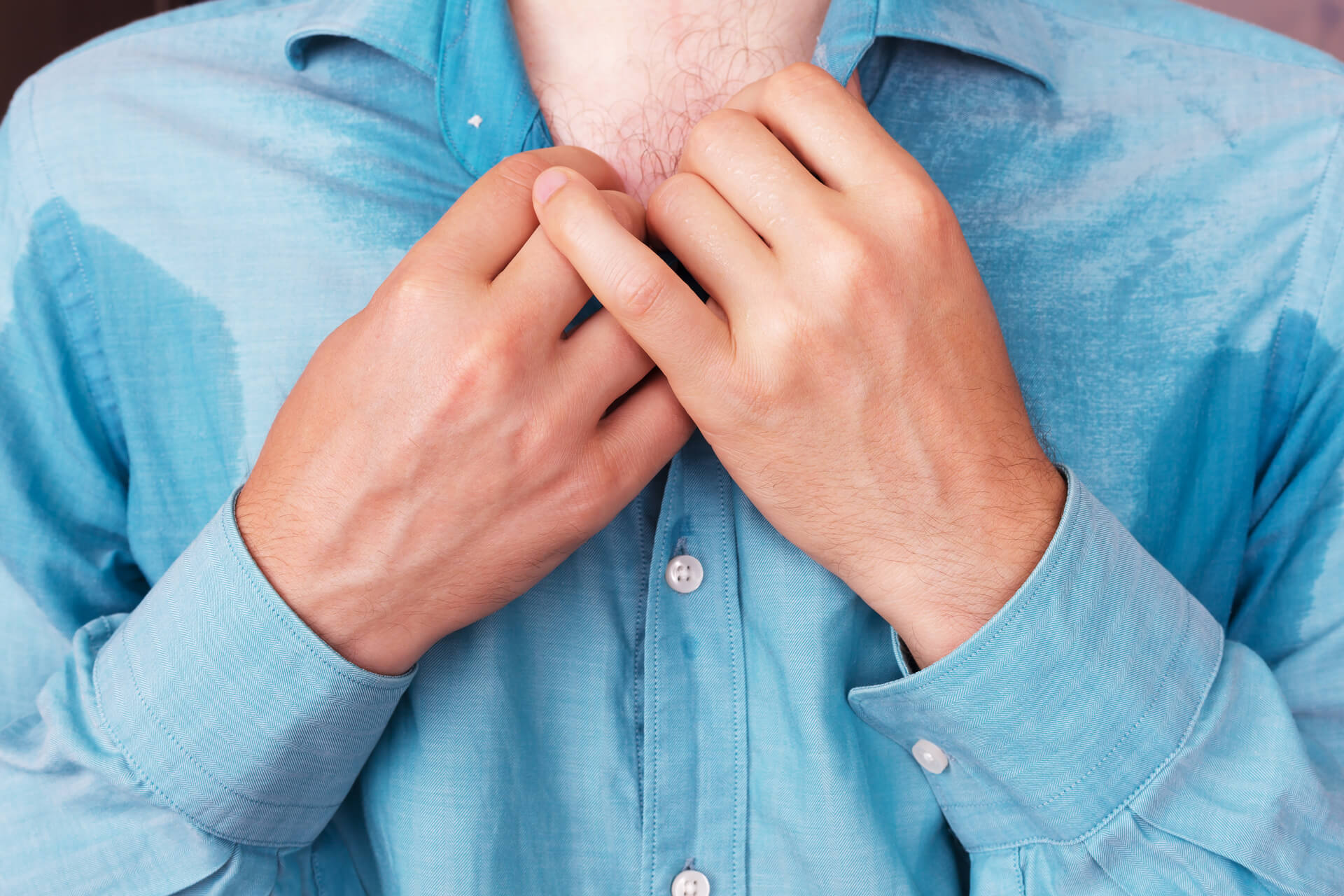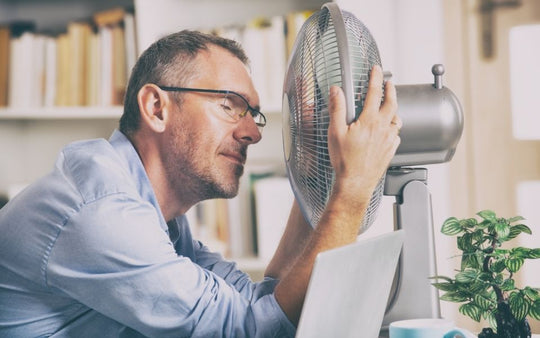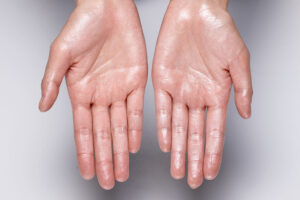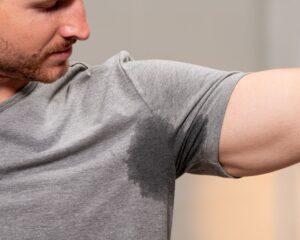What Is Diaphoresis? Sweating As a Medical Side Effect
Table of Contents
Are you sweating profusely for no apparent reason? Is it the kind of sweating that can’t be explained by exercise or external temperature– or even unusual stress?
The cause of your excessive sweating may be diaphoresis.
In this article we’ll explore the following topics surrounding diaphoresis…
- What is Diaphoresis?
- What Causes Diaphoresis?
- What Medications Can Cause Diaphoresis?
- How is Diaphoresis Different than Hyperhidrosis?
- When Should I Get Medical Help or Talk to My Doctor?
- What are the Treatment Options for Diaphoresis?
Why do we sweat? Sweating is the natural way the body manages and regulates its temperature. When functioning normally, your body perspires when you’re engaged in exertion or physical exercise, exposed to external heat, and even when you’re feeling unusual mental or emotional stress.
When you perspire, your brain signals the millions of sweat glands located all over your body (except ear canals, lips, and genitals) to secret moisture composed mostly of water and electrolytes. Once this sweat reaches the surface of the skin, it evaporates. The evaporation of your sweat dissipates heat which in turn cools the body.
If unusual and excessive sweating occurs for no apparent reason, then something else is going on. It may be primary hyperhidrosis (more about that later) or diaphoresis. It’s important to understand the difference to know exactly what’s happening with your body.
What is Diaphoresis?
Diaphoresis is excessive sweating caused by one or more secondary (meaning separate and not related) medical conditions. It can also be a side effect of certain medications. Diaphoresis is not a problem of a malfunctioning nervous system or overactive sweat glands, and treating it successfully usually requires medical attention to discover the specific cause.
Diaphoresis is also known as secondary hyperhidrosis because it is a symptom of a secondary disorder. Once the cause is identified and properly treated, the excessive sweating stops.
What Causes Diaphoresis?
There are dozens of diseases and medical conditions that can cause diaphoresis. Some of the most common causes are:
Menopause
A majority of women (85% or more) experience periods of increased sweating, night sweats, and hot flashes during menopause. As a woman transitions from fertility to infertility, fluctuating hormones send false signals to the brain that the body is overheating. This results in excessive perspiration and night sweats. Once the menopausal change progresses, the bouts of profuse sweating and night sweats usually cease. Some women find relief through hormone therapy for a short time.
Obesity
Obesity can cause diaphoresis in both men and women. Defined as having a body mass index (BMI) of 30 or higher, obesity is very common in the United States and affects one-third of all adults. Losing sufficient weight almost always causes the excessive sweating to stop.
Diabetes
For people with diabetes, sweating profusely is an early symptom of low blood sugar (hypoglycemia). Critically low blood sugar is a result of either too much insulin or too little sugar. This causes the body to lapse into a fight-or-flight state, releasing hormones that increase sweating. Proper management of diabetes significantly reduces the occurrence of diaphoresis.
Parkinson’s Disease
Coping with Parkinson’s disease is very difficult, but when you add excessive sweating to the equation it becomes even worse. Parkinson’s disease affects the autonomic nervous system, causing the body to lose its ability to properly regulate many body functions. Changes in the sweat glands often occur and can cause Parkinson’s sufferers to sweat uncontrollably.
Pregnancy
Increased hormone levels (some may say raging hormones) in a woman’s body during pregnancy can cause heavy perspiration. As a pregnant woman’s metabolism speeds up, her body temperature rises, which can cause abnormal sweating. The extra weight gained during pregnancy may also increase the likelihood of diaphoresis. Fortunately, it’s only a 9-month-long condition, then the sweat glands return to normal.
Rheumatoid Arthritis
Rheumatoid arthritis is an autoimmune disease that affects the body’s joints, causing swelling, pain, and stiffness. A common symptom of this disorder is excessive sweating.
Hyperthyroidism
Hyperthyroidism is a medical condition in which the thyroid gland shifts into hyperactivity, producing too much of the hormone thyroxine. The overabundance of thyroxine speeds up the body’s metabolism and causes heavy sweating (among a number of other symptoms).
Heart Attack
A heart attack, aka myocardial infarction, happens when a portion of your heart muscle becomes damaged or dies. Symptoms include heavy sweating, faintness, chest pain, pain in one or both arms, shortness of breath, nausea or vomiting, and a pale or ashen colored face.
Cancer
Diaphoresis is linked to several types of cancer. Among them are lymphoma, leukemia, bone cancer, liver cancer, testicular cancer, as well as carcinoid tumors.
Anaphylaxis
Anaphylaxis is an intense and acute allergic reaction. One of the first signs of an anaphylaxis reaction is an instant onset of heavy and profuse sweating. Anaphylaxis is a life-threatening reaction that requires immediate attention and treatment.
Alcohol and Drug Withdrawal
Profuse sweating often occurs when those addicted to alcohol or drugs go through withdrawal. Going “cold turkey” not only leads to excessive sweating but also includes other reactions that can be temporarily life-threatening.
Gout
Diaphoresis (secondary hyperhidrosis) can also be caused by gout. Gout is a common form of arthritis that develops from high levels of uric acid in the blood. It can strike anyone. In addition to excessive sweating, other symptoms of gout include sudden swelling and joint pain, usually in the big toe.
What Medications Can Cause Diaphoresis?
There are hundreds of medicines that have been known to cause excessive sweating. The most common medicines that can cause diaphoresis include:
Antidepressants
All varieties and classes of antidepressants may cause diaphoresis. Antidepressants increase serotonin levels in the brain. Serotonin affects the hypothalamus, which is the part of the brain that regulates the body’s core temperature.
Migraine Medication
Medicine for migraines can cause excessive sweating if they contain triptan– such as sumatriptan, rizatriptan, frovatriptan and eletriptan. These substances also increase serotonin levels.
Pain Relievers
Aspirin or ibuprofen are known to cause excessive sweating. The over-the-counter pain medicines reduce a fever by dilating blood vessels, causing heat to be dissipated through the skin. Opioids may also cause heavy sweating.
Diabetes Medication
Insulin, glyburide, glipizide, pioglitazone, and other diabetes medication are known to cause diaphoresis. Heavy sweating can occur as the body adjusts to altered blood sugar levels.
Asthma Inhalers
Certain asthma inhalers which contain beta-agonist drugs may trigger excessive sweating. Albuterol and levalbuterol directly stimulate sweat glands to produce more sweat.
Heartburn Medication
Heartburn and reflux medicines like Prilosec and Prevacid are known to cause sweating as a side effect.
Sildenafil (Viagra)
Viagra, known as sildenafil in its generic form, may also cause diaphoresis. The drug dilates blood vessels to heighten blood flow, which can cause flushing and spontaneous sweating.
Ropinirole
Also known as Requip, this medication is commonly prescribed to treat restless leg syndrome and Parkinson’s disease. It activates dopamine receptors which can lead to profuse sweating.
Breast Cancer Medication
Excessive sweating can be a side effect of certain breast cancer medications, such as anastrozole, exemestane, letrozole, and tamoxifen. These drugs are anti-estrogen compounds designed to prevent breast cancer from recurring.
Leuprolide
Luprolide, known commercially as the brand name Lupron, is a drug prescribed to treat endometriosis and prostate cancer. It lowers hormone levels in both men and women and can lead to heavy sweating and night sweats.
How is Diaphoresis Different than Hyperhidrosis?
There are two types of hyperhidrosis– primary hyperhidrosis (also called focal hyperhidrosis) and secondary hyperhidrosis (sometimes called generalized hyperhidrosis).
Diaphoresis and secondary hyperhidrosis are synonymous they are different medical terms for the same condition. But diaphoresis is different from primary (focal) hyperhidrosis. Let’s explore how diaphoresis is like secondary hyperhidrosis but different from primary hyperhidrosis.
Primary or focal hyperhidrosis is a serious medical disorder that is characterized by excessive, uncontrollable sweating not related to heat or exercise. Recent research indicates that it affects about 5% or the world’s population. It can be focused on the underarms (axillary hyperhidrosis), the hands or palms (palmar hyperhidrosis), the feet (plantar hyperhidrosis) or the head and face (craniofacial hyperhidrosis).
What causes primary hyperhidrosis is unknown, but it is thought to be hereditary. The nervous system triggers localized sweat glands, known as eccrine glands, into hyperactivity for no apparent reason and without external stimuli such as elevated body temperature and exertion. This extreme perspiration can negatively affect the physical, emotional, mental and social aspects of life. There is no cure. However, there are numerous effective treatments that can reduce or eliminate the excessive sweating due to primary hyperhidrosis.
The cause of secondary hyperhidrosis, or diaphoresis, is something else entirely. While the symptoms of diaphoresis and primary hyperhidrosis are identical– profuse, uncontrollable sweating– diaphoresis is caused by a secondary or underlying cause not related to over-active sweat glands. The possible causes include the disorders and medications identified above as well as dozens of other less common ones. Unlike primary hyperhidrosis, once the underlying disorder is successfully treated, the excessive sweating usually stops.
When Should I Get Medical Help or Talk to My Doctor?
It’s normal to sweat when you work out, become hot, or find yourself in a nervous or anxious situation such as a job interview, important presentation, or on a first date. Nervous sweating is also normal, though darn inconvenient at times. But you should become concerned if you find yourself frequently soaking through your shirts or socks, or trying to hide your perpetually wet, clammy hands. Yes, it’s embarrassing, but thankfully your excessive sweating can be treated. Don’t suffer in silence out of shyness or shame. Start by seeing your primary care doctor. He or she can refer you to a specialist if necessary.
What are the Treatment Options for Diaphoresis?
The best and most effective treatment of diaphoresis is to treat the underlying disease or disorder that is triggering the profuse sweating.
In the meantime, here are some remedies that may help reduce your excessive sweating. When it comes to some of these natural and home remedies, your mileage may vary. The International Hyperhidrosis Society has concluded there is “little research to recommend such natural remedies, but this does not discount their potential.”
Natural Remedies for Treating Diaphoresis
Camphor
Camphor was once made by distilling wood from the camphor tree. Today it is synthesized chemically. It’s used in such products as Vicks VapoRub. Dissolve a small portion of camphor or some camphor oil in some fractionated coconut oil. Apply the mixture to affected areas and leave it on the skin for 40 to 60 minutes. Then wash the area gently with cool, clean water. Camphor can also be added to bath water to help reduce sweating.
Vinegar
When applied directly to your skin, vinegar acts as an astringent that eliminates many bacteria and will also close up pores. Use a cotton ball to dab a little apple cider vinegar on the desired areas overnight. Simply wash it off when you shower or bathe in the morning.
Tomato Juice
A glass of tomato juice or a tomato-rich diet can help control profuse sweating by regulating your internal body temperature.
Green and Black Tea
Green tea contains magnesium and vitamin B. These act as astringents and constrict sweat glands. A cup of green tea in the morning may help reduce sweating. Black tea is also an astringent. Brew one or two black tea bags, allowing the tea to steep for 10 minutes. Apply the tea directly to your underarms with a clean washcloth.
Essential Oils
Those who prefer natural remedies often recommend essential oils as a remedy for excessive sweating. If you want to try essential oils, you should thoroughly study the potential benefits and hazards of each beforehand.
Here are 3 of the most popular essential oils for controlling sweat:
- Sage oil has long been used to ease the symptoms of menopause.
- Cistus oil is an astringent that can shrink pores.
- Clary Sage oil contains linalyl acetate which has calming properties.
Other Effective Remedies
There are several effective remedies for primary hyperhidrosis. However, because of their permanence, expense, or invasiveness, they likely wouldn’t be appropriate for treating diaphoresis. It’s important to remember that curing diaphoresis means identifying and successfully treating the underlying, unrelated disease or disorder that triggers the excessive sweating.
Short of overcoming the disorder that’s responsible for diaphoresis, here are two remedies that can treat the profuse sweating without permanently altering, removing or destroying sweat glands:
Clinical-Strength or Prescription-Strength Antiperspirants
These powerful antiperspirant products, like SweatBlock, are different than the antiperspirants you find on the shelves of your local grocery or drug store. They contain higher concentrations of the aluminum chloride, a compound that temporarily blocks the sweat glands from secreting sweat. When aluminum chloride comes in contact with water (your sweat), it forms a gel-like plug that blocks sweat from reaching the surface of the skin. A single application of a prescription strength antiperspirant may last up to a week before it must be reapplied.
Botox Injections
Botox is a natural, purified protein that can temporarily impede the chemical that “turns on” the body’s sweat glands. It blocks the nerves that cause sweating. Botox injections are shallow and the medicine is injected just below the surface of the skin. The desired effects will last 6 to 12 months before the treatment must be repeated. While effective, this treatment is very expensive and can be painful.
A Final Note
Diaphoresis, by definition, is always caused by another illness or medication. The best treatment is always to identify and appropriately treat the underlying condition. Once that happens, the excessive sweating almost always stops. If treatment for the secondary cause is not possible or requires a prolonged period to take effect, there are treatments and remedies that can help in the meantime. Talk to your doctor about your symptoms and available treatment options.
You might also like...

Why Do I Sweat So Much? And So Easily?
WHY DO I SWEAT SO MUCH? : ARTICLE CONTENTS Sweating a lot? … when you workout, sleep, after eating, or

What is Focal Hyperhidrosis? Symptoms, Treatments, & Tips for Managing It Successfully
Table of Contents Does excessive sweating bother you? Keep you from being social? Or make you feel like you can’t

Is There a Hyperhidrosis Cure? 11 Hyperhidrosis Treatment Options
If you’re one of the roughly 8 million Americans who deal with excessive sweating (also known as hyperhidrosis), this article
















